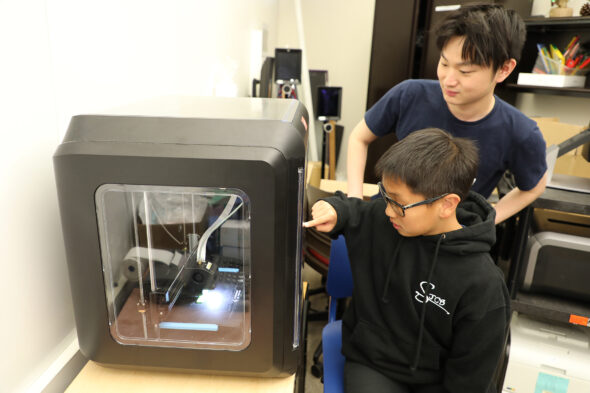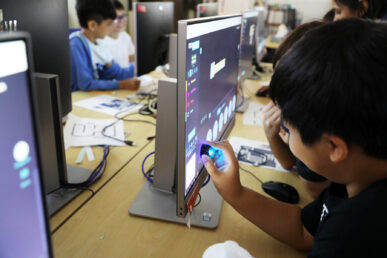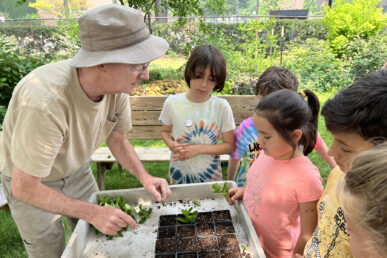Chicago youth discover their passions, potential at College of Education summer camps

From programming robots to learning about horticulture, College of Education summer camps provided Chicago-area youth with a range of opportunities to explore, learn and grow this summer.
“We are thrilled to design and lead these experiences, activities and opportunities for Chicago youth,” College of Education Dean Kathryn Chval said. “Community engagement has been a central focus of the College of Education since it was founded.”
Several different college departments and initiatives offered camps and experiences this summer that supported a wide array of youth and their interests.
From worms to 3D-printed sneakers
Education Technology Lab summer camps, in their seventh year, offered two separate weeklong STEM summer camps, with almost 50 Chicago youth participating.

In one project, the students created a terrarium, complete with worms. “We got to observe worms, which is really fun. I got to take some home,” said Emma Avila, a 12-year-old who attended the ETL summer camp. “I learned that worms don’t really like light. So, they dig themselves in the dirt. And they like warm and damp environments.”
Advaith Muthu, 9, said he wants to work with particle accelerators when he grows up and enjoys the opportunities around science. Technology was integrated throughout the camp, including experiences with hydroponics, computer coding and miniature robots that were programmed to follow a simple path.
An opportunity to use a 3D printer was 10-year-old Alexander Woo’s favorite part of the ETL summer camp. “I made three miniature sneakers that were pretty cool,” he said.
Ernesto Reyna, IT director for the College of Education, said interest in the Educational Technology Lab’s summer camps is driven by word-of-mouth.
“The community knows this camp is engaging and affordable. We provide scholarships so that we don’t turn away families,” he said.
Art for sustainable living
Kristine Schutz and Rebecca Woodard, associate professors in curriculum and instruction, have been working to better understand how literacy education can focus on climate justice and sustainability in English language arts instruction. This summer, they hosted a nature art camp for Chicago youth in the College of Education’s Make Good Lab, a maker space and digital production studio.

“The camp provides us an opportunity to put some of that work into action with local youth,” Schutz said. “We focused on three questions: What do we notice when we look for nature in the city? How does this help us live sustainably? How can we use art activism to make an impact?”
Led by Evelyn Pollins and William Peek, graduate students in literacy, language and culture, the campers read books to support their inquiry and visited gardens on UIC’s campus, including the UIC Greenhouse, the Heritage Garden and the Atkins Medicinal Plant Garden. They created art in many forms, including disintegration style split art inspired by art activist Sabrina Beretta, nature collages, and altered photographs that campers took with pinhole cameras they made.
A space to hone their voice
“Black Youth Write! Black Youth Create!” was offered for the second year by the Centering Black Lives, Thought and Liberation initiative. This summer, 12 Black youth participated.
The program was created by Gholdy Muhammad, associate professor of curriculum and instruction, who has conducted different iterations of “Black Youth Write!” for more than 15 years. The purpose is to provide rich and engaging experiences for Black youth to hone their voices to build their repertoire of skills in writing and art, all while in community with other Black youth.
“We wanted a space where Black youth were the focus, and their words and ideas were shared and crafted into powerful statements of affirmation and commitment to justice and liberation. It was also important that Black youth feel cherished,” said Torica Webb, clinical associate professor of curriculum and instruction, who was the primary facilitator in cooperation with a group of doctoral and undergraduate students.
The institute supplied participants with composition notebooks, sketchbooks, drawing pencil sets, pencil cases, folders and water bottles that they used during the program and could use at school and other locations after the institute concluded. Each participant was given a mini library of 10 books written by Black authors that centered on the lives and experiences of Black people, including “Brown Girl Dreaming” by Jacqueline Woodson and “The Boy Who Harnessed the Wind” by William Kamkwamba.
“This allowed participants to see themselves and their lives represented on the page and read amazing literature and stories by talented writers,” Webb said.
Throughout the institute, the participants learned about Black writers, dancers, photographers, musicians and poets and how they used words and images to express the truths about Black people’s lives, experiences, knowledges and contributions.
“The opportunities from these experiences aligned with the key values of the college: hope, engagement and justice,” Chval said. “It is a privilege to offer experiences that facilitate joy, hope and engagement for young people in our city. It is our hope that others will partner with us to expand these types of opportunities for children in Chicago in future summers.”
